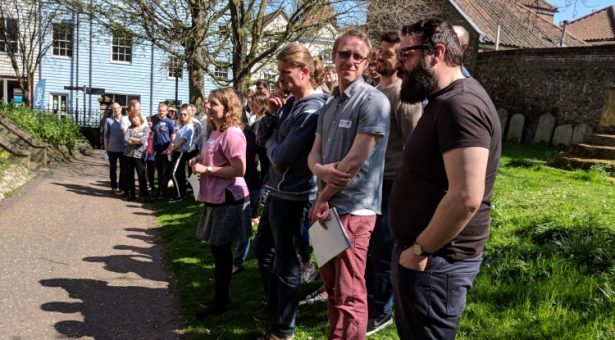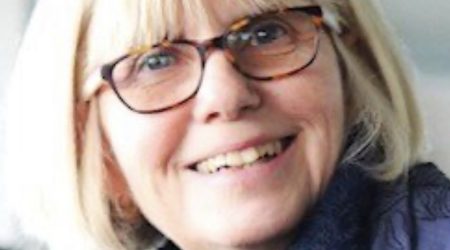Introducing PostDoc Voice and QIPS

By Kelley Gallagher (Postdoc Voice – John Innes Centre) and Mark Kirkwood (QIPS – Quadram)
Kelley: PostDoc Voice is an organisation that represents Postdoctoral Scientists at the John Innes Centre.
We have representatives on various John Innes Centre committees and hold networking events throughout the year. We also bring issues and needs of the Postdoc community, directly to the Directorate.
Mark: QIPS is a much newer group compared to the JIC Postdoc Voice, as we’ve only been established for a year.
As such, we have a slightly smaller remit, focusing on bringing Postdocs at Quadram together for social events, as well as liaising with the Postdoc Voice, to foster closer ties between the institutes.
We were inspired to set-up QIPS by the work of the Postdoc Voice.
When you’re a PhD student, you receive a lot of support from your Supervisor and some excellent, established networks. Plus, you join the institute with a group of fellow PhD students, meaning you are immediately part of an established community.
When you become a Postdoc, it is like the training wheels are taken off and suddenly you are expected to be much more independent and able to fend for yourself. It’s a case of “you know what you’re doing now, so go and get on with it” – that can be a difficult adjustment because there is very little distinction between long-term Postdocs who are on the 3rd or 4th placement, to those who are just starting out, or returning to science after a career break, like I did.
It can be quite a big shock, so organisations like PostDoc Voice and QIPS are vital to the continued success of any institute.
The point of both groups is to convey the message to Postdocs; you are not alone. It’s really easy to feel isolated, but you’re not.
Kelley: There is a lot of variability in the Postdoc experience, so we try to provide a support network if people need more help, then we can point them in the right direction.
There are no ‘membership’ requirements; if you are a Postdoc then groups like Postdoc Voice and QIPS are here for you.
Everyone is welcome and everyone has the opportunity to contribute and have their say.
Mark: The life of a Postdoc is by nature, like all science, insecure. You are always chasing the next grant, new funding or thinking about the next project.
There is always a deadline looming, so you are constantly on the lookout for the next opportunity.
Kelley: The short-term nature of postdoctoral fellowships is certainly one of the most stressful aspects of being a Postdoc, even though you start to become accustomed to it once you have been in research a little while. It becomes a way of life, you live in the moment and enjoy working on the science you have in front of you, while remaining mindful to also look forwards so you don’t suddenly hit a dead-end.
Mark: The short-term nature of science is definitely pervasive. When I started my Postdoc I was immediately thinking; ‘right what am I going to do in 3 years’ time?’ It’s always in the back of your mind. It’s quite a stressful position, being a Postdoc.
It is a double-edged sword, though as you have the freedom to go anywhere.
Science provides some incredible moments too. Often progress is slow, but when a breakthrough comes, there is no feeling like it.
Sometimes I can be sitting in front of a computer all day, feeling like I am getting nowhere and then suddenly see something and think ‘wow that’s amazing, I never spotted/ realised that before’ and you become aware that you have just learned something that nobody else in the world knows. Although it is a scientists’ nature to see that and then start wondering what might come out of that and what new questions it will prompt.
Kelley: That is one of the big reasons behind why we established the Postdoc Retreat, because we want people to have the chance to consider what the parts of their job that they enjoy the most, so they can start to formulate a plan as to what would make them happiest in the future.
The Postdoc Retreat is our flagship event of the year, where we offer Postdocs the chance to take a day out of the lab and to think about what they might want to do next, what options are open to them, what might be alternative career paths and what do people need to be doing to work towards building the future they want for themselves.
It’s also an excellent social event and every year we get lots of comments from Postdocs saying that it gave them the opportunity to meet people they would never normally encounter on-site.
Mark: Events like the Postdoc Retreat are really useful because they encourage you to be more introspective and really consider where you want to go, what you want to do and how you get there.
It is hard to have a 10-year plan, when you’re working in 3-year chunks.
Hearing about non-traditional career paths is fascinating, and encouraged me to think more about what I want to do next and not be scared taking a leap.
Kelley: I agree, it inspired me to think about the things I enjoy (and don’t enjoy) in my working life and to be proactive about building a career around (or avoiding) those things.
There are so many experiences and opportunities available to try different things, but it is on you to go out and seek them out.
It can be really easy to get caught up in the everyday life of being at the bench, so take the time to get out there and try something new.
If you’re not sure what you want to do, go and try a bit of everything and get a better idea of what you do and don’t enjoy.
Mark: I completely agree; knowing what you dislike about your job is sometimes more important than knowing what you like about it.
Kelley: In terms of our future plans; on 31 July we will be holding an open forum meeting with John Innes Centre Director Dale Sanders, all Postdocs are welcome to come along to that, to have an informal discussion about the needs of the Postdoc community.
There will then be social events taking place through the summer through both PostDoc Voice and QIPS, so keep an eye out over the next few months for more details.

